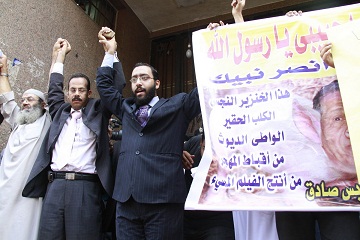
By Hussein Abd Rabu
One of the most important readings of the anti-terrorism law that the Egyptian government rushed to pass after the assassination of the prosecutor general, was the state of instability in managing the country.
Rushing to draft a law without adequate studies and discussions caused the law to direct a strike towards the Egyptian press, rather than terrorists. It’s as though the legislators wanted to punish the media for the mistakes committed by some of their bodies during the coverage of the Sheikh Zuweid events earlier this month, by publishing unrealistic numbers of causalities from the Egyptian army, citing foreign sources and websites.
Some state authorities tried to take advantage of the mistakes to drive a wedge between the media and public opinion, portraying the Egyptian media as an advocate of terrorism. This was despite the fact that mistakes in essence began from the state’s side due to the late issuance of official statements regarding the events of Sheikh Zuweid.
This opened the door for the media’s discretion in its attempts to gain access to any information about the events that went on for 12 hours, without the issuance of official statements on them.
The anti-terrorism law, with its shocking articles that violate press freedom and threaten to imprison and suppress journalists, most notably Article 33, managed to unite press groups in a new battle against the violation of freedom of the press.
The meeting that the Press Syndicate called newspaper editors for last Thursday clearly expressed the attitude assumed by the press against the unconstitutional law, due to its violation of Article 77 of the constitution. The article stipulates that a poll will be held in the Press Syndicate during the drafting of any legislations related to the journalistic profession, which did not take place in the case of the anti-terrorism law. This was acknowledged by the Minister of Justice, Ahmed Al-Zind, during his meeting with the Prime Minister in the Press Syndicate council last Wednesday.
Some of the attendees of the council meeting considered the anti-terrorism law a harbinger of a new wave of emergency laws that some of the state’s authorities seek to activate, but fear doing so under the name “emergency law”, as it may be used against them internationally.
Despite the consensus to reject the articles that hijack the freedom of the press and journalists by the law, they confirmed that they are not against the law and that they will hold a discussion with the state, through a legal memorandum, on the importance of eliminating the articles that suppress the freedom of the press.
There is an acknowledgment among press circles of the clear deficiency in the media approach to many issues, described by some as a state of uncontrollable media. There are thus demands that the syndicate improve the professional performance of the press and take up a clear stance towards violators.
It is strange that some of the attendees of the council meeting were editors-in-chief with close relations with decision-makers who themselves seemed surprised by the issuance of a law with articles that violate the freedom of the press. They asserted that some hidden parties are plotting against Egypt and seek to turn it into a police state through the passing of such laws that drive a wedge between the press and public opinion.
Hussien Abd Rabu is an Egyptian journalist and assistant Editor-in-Chief of Al-Borsa newspaper



